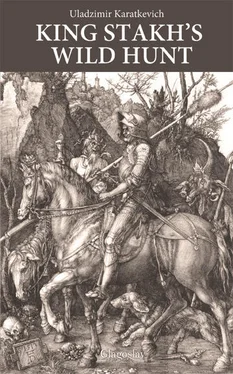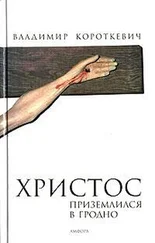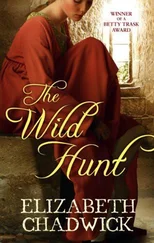What could it have been? I believe neither in God nor in ghosts, however, this creature could not have been a living being. And moreover, from where could it have appeared, where had it disappeared to? Where could it exist? There was something mysterious in this house. But what? Is it possible that it really was a ghost? My entire upbringing rebelled against that. But perhaps I was drunk? No, I had drunk almost nothing. But where had the steps come from, those steps that are even now sounding in the corridor? Did they sound then or didn't they when I saw the face of that monster in the window?
My curiosity reached the limits of feasibility. No, I would not leave this place the next day, as I had thought. I had to unravel all this. The girl who had today given me yet another fine memory to keep, will go mad with fright, something not in accordance with the laws of nature was going on there and I wouldn't leave. But who would help me in my search? Who? And I recalled Śvieciłovič's words: “I would crawl up to her feet and breathe my last.” Yes, it was with him that I had to meet. We would catch this abominable thing, and if not — I would begin to believe in the existence of green ghosts and God's angels.
Two days later I was approaching Dubatoŭk's house. I did not want to go there, but my hostess had said: “You must go! It's my order. I won't be afraid here.”
I was to follow a grass-covered lane in a south-west direction from the house. Along both sides of this path stood a park as gloomy as a forest. The lane led to a fence where at one place an iron rod was missing and I could creep through it (this was Janoŭskaja's secret which she had confided to me). Therefore I didn't have to go north along the lane I had arrived on and walk round the whole park to reach the road leading to Dubatoŭk's house. I crept through the hole and came out onto level land. To the left and straight ahead of me there was boundless heather waste land with sparse groups of trees, to the right some undergrowth, behind it a full little river like an eye, then a swampy forest, and farther on, hopeless quagmire. Somewhere very far from the heather waste land, tree-tops could be seen, probably Dubatoŭk's estate.
I walked slowly through the waste land, only from time to time guessing where my path lay. And though the autumn field was a gloomy one and not inviting, though an enormous raven twice flew overhead — after Marsh Firs it was pleasant here. Everything all around was familiar: the moss on the marsh mounds, the dry heather among the tiny mouse dragging white down from a tall thistle to the nest it was preparing for winter.
I reached Dubatoŭk's estate only towards dusk, the windows of his house were already brightly lit. It was a most ordinary house, the usual thing among the gentry: an old, low building with small windows. It was shingle-roofed, freshly whitewashed, had a porch, with four columns. The provincial architect had very likely been unaware of the well-known secret and therefore the columns seemed to bulge in the middle and looked like little barrels. The house was surrounded by old, enormous, almost leafless lindens. Behind the house there was a large orchard, and behind it a wide piece of ploughed land.
I was late apparently, for noisy voices were already thundering throughout the house. I was met warmly, even ardently.
“Goodness gracious! Holy Martyrs!” Dubatoŭk shouted. “You've come after all, the prodigal son has come! Come to the table! Antoś, you lout, where are you? Have you got two left paws, or what? A welcoming drink for my guest! Missed meeting him, you devils, didn't salute him, didn't give him a drink at the door! Oh! You blockheads!”
About ten people were sitting at the table, all men. Among them I knew only Śvieciłovič, Aleś Varona and Stachoŭski. Almost all of them were already quite drunk, but for some reason they examined me with increased interest. The table was bursting with viands: Dubatoŭk was, evidently, of the well-to-do local gentry. His wealth, however, was relative. Of food and drink there was plenty, but the rooms through which I went showed no splendour. The walls were whitewashed, the shutters were covered with fretwork and brightly painted, the furniture was not very beautiful, but as if to make up for that, very heavy. Old-fashioned things stared o.ut from every corner. In the dining-room there was nothing but a wide oak table, stools covered with a green, silky linen, two Dantzig armchairs covered with golden Morocca, and a triple mirror in a brown frame, depicting a city with church domes. The gaudily dressed guests viewed me with curiosity.
“Why are you staring?” Dubatoŭk shouted. “Have you never seen a man from the capital, you bears? Come, food for the guest! Put food on his plate, whatever is to your taste.”
The hairy jaws began to smile, the paws began to move. Soon on my plate lay an enormous goose with cranberry jam, the leg of a turkey with apples, pickled mushrooms, a dozen kuldoons, and from all sides came:
“And here are doughnuts and mushrooms with garlic... here is a piece of ham from a wild boar, strongly peppered, burns like fire. I swear to it by the memory of my mother... take it. And this is wonderful. And this here is something exceptional...”
“This is how we Belarusians treat our guests,” the host shouted on seeing my confusion, and he laughed boisterously.
In front of me food was piled high. I tried to protest, but that called forth such an outburst of indignation (one of the guests even began to shed tears;) truth to tell, he was in a blue haze, and I yielded.
The lout Antoś brought me a glass of vodka on a tray, for a start. I am not afraid of intoxicating liquors, but seeing it I got scared. There was no less than a bottle of some yellow transparent liquid in the glass.
“I couldn't!”
“What do you mean you couldn't? Only a virgin wench can't, but even she quickly agrees.”
“It's too much, Mr. Dubatoŭk.”
“When there are three wives in a hut, that's too much, and at that not for everyone... Oh! Boys, we aren't respected. Ask the dear guest to...”
“Don't offend us... and drink...” The guests roared like bears. I was forced to drink. The liquid burned my inners, fiery circles swam before my eyes, but I kept steady, didn't even make a wry face.
“There's a man for you!” Dubatoŭk praised.
“What's this?” I asked as I swallowed down a big piece of ham.
“Oho! The Starka, old Polish vodka, even the Ukrainian vodka Spatykach; but our “Tris Deviniris” you do not know. In Lithuanian [7] Here Balt-Samogitian.
, brother, it is “Thrice Nine” — a vodka made of 27 herbs. This secret we wormed out from the Lithuanians hundreds of years ago. Now the Lithuanians themselves have forgotten it, but we still remember. Drink to your heart's content, then I'll treat you to some mead.”
“And what's this?” I wanted to know, sticking my fork into something dark on my plate.
“That is salmon lips in sweetened vinegar. Eat, brother, refresh yourself. This is food for giants. Our forefathers, may they rest in peace, were not fools. Eat, don't be lazy, and eat!”
And within a minute, having forgotten that he had recommended me the “lips”, he shouted:
“No, brother, you won't leave me without having tasted cold pasties stuffed with goose liver. Antoś!...”
Antoś came over with the pasties. I tried to refuse.
“Go down on your knees at the feet of our guest. Beat your foolish head against the floor, beg him, because as a guest he is offending us.”
Soon I, too, was in a good state. Everyone around was screaming and singing. Dubatoŭk was hanging on to my shoulder, mumbling something, but I paid no attention. The room was beginning to swim.
Читать дальше



